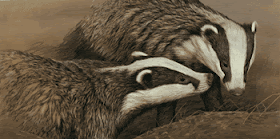
Last night I stayed the night in my badger bunker - the stars were amazing & the badgers weren't bad either. I saw 8 different adults and 3 cubs.
Mum took two of the cubs foraging up the bank to one of the sett's outposts, chittering as she went. En route, she came across the boar and they started to groom each other. The cubs continued to rive about and playing - so full of energy.
Mum decided she wanted a bit of 'me time' and deposited the cubs into the nearest hole so she could enjoy a night stroll with the boar. But the cubs were having none of it. They were wide awake & followed the pair at a distance. She carried each back to the hole with great patience, until after the 4th time of disobedience she had to give one of them a bit of a scuffle.
Temperatures plummeted to below freezing last night, so I was a bit on the cold side and I was woken up by another cub, who had accidentally popped out of a hole in the middle of the night and couldn't find his way back - he sounded like a trapped piglet. But it was certainly good fun, so I'll be back again soon.











